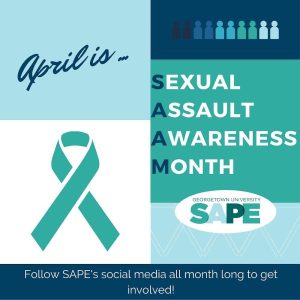CW: This article references and discusses sexual assault and rape. Please refer to the end of the article for on- and off-campus resources.
Georgetown Sexual Assault Peer Educators (SAPE), a student group that hosts workshops and offers resources about sexual assault, organized a new clothesline project and survivors’ circle initiative as part of their April programming for Sexual Assault Awareness Month (SAAM).
The clothesline project encourages survivors and advocates to create messages about sexual violence on white t-shirts, and the survivors’ circle initiative focuses on interpersonal growth through group discussion. Thao Nguyen (MSB, SFS ’24), a main organizer at SAPE who works on campus outreach and workshop design, said students should use SAAM as an opportunity to help build a survivor-centric environment rooted in healing, which is the theme the organization chose for SAAM this year.
“SAAM is an opportunity for us to come together as a community to reflect on the issue of sexual violence on campus and recognize that we all have a role to play in fostering a healthy, survivor-centric community at Georgetown,” Nguyen wrote to The Hoya. “Our theme this year is healing as we want to focus on ways in which we can reimagine healing and justice at Georgetown when it comes to sexual violence.”

The National Sexual Violence Resource Center (NSVRC), a nonprofit that confronts sexual violence, first observed SAAM nationally in 2001, with President Obama officially recognizing the campaign in 2009.
SAPE’s survivors’ circle involves a partnership with Restorative Georgetown, a Georgetown organization that aims to forward restorative justice and community healing.
Nguyen said these circles will allow community members to come together to discuss responsibility, root causes of sexual assault and prevention methods.
“This practice seeks to broaden the focus from punishment to community healing and systemic harm reduction,” Nguyen wrote. “For this event, SAPE and Restorative Georgetown invite any community member who wants to reflect on the issue of sexual violence at Georgetown to the circle guided by one of our staff clinicians at the Health Education Services office.”
In addition to the new clothesline project and survivors’ circle, this year’s programming includes annual fixtures like Denim Day. The day recognizes a 1990s Italian Supreme Court decision that overturned a rape conviction on the grounds that since the survivor was wearing tight jeans, she must have helped her assailant remove them, implying her consent. SAPE is partnering with Georgetown REUSE, a student organization that sells affordable used items to the community, to host Denim Day programming April 24.
Norah Solaiman (SON ’27), a member of SAPE, said that Denim Day helps display a public showing of support for respecting the basic concept of consent in the context of a ruling that did not properly present consent.
“Obviously, that’s not how consent works,” Solaiman told The Hoya. “And so, Denim Day as a whole is kind of a remembrance of that and an empowerment of survivors.”
The organizations will host a denim thrift event with proceeds that will go to D.C. SAFE, a local domestic violence shelter, according to Nguyen. The day of programming will also include a restorative justice circle and a meditation session.
Nguyen said the white t-shirts that students design for the clothesline project will be displayed in an exhibition on Denim Day.
Alexandra Huss, a Georgetown clinician who serves as a mentor to SAPE and counsels survivors on campus, said SAPE’s programming this April is essential to helping survivors feel supported on campus.
“Increasing awareness for sexual assault is important because we want our students who have experienced sexual violence to know that they are not alone, that we have resources to support them, and that they have nothing to be ashamed of,” Huss wrote to The Hoya. “We also want to work towards creating a campus that holds those who harm accountable, in whatever form that may take.”
The 2019 Campus Climate Survey found that 31.6% of undergraduate women and 11.6% of undergraduate men nationwide had experienced nonconsensual sexual contact during college. Nguyen said that the survey’s findings illuminate the importance of SAAM.
“It is likely that every community member will have been in a situation where they can play an active role in preventing sexual violence on Georgetown campus,” Nguyen wrote.
Solaiman said that SAPE is emphasizing preventative measures to address systemic issues.
“We’re focusing less on carrying tasers and pepper spray and things of that sort and focusing more on stopping the problem at its source and stopping needing any of those measures,” Solaiman said.
Resources: On-campus resources include Health Education Services (202-687-8949) and Counseling and Psychiatric Service (202-687-6985)); additional off-campus resources include the D.C. Rape Crisis Center (202-333-7273) and the D.C. Forensic Nurse Examiner Washington Hospital Center (844-443-5732). If you or anyone you know would like to receive a sexual assault forensic examination or other medical care — including emergency contraception — call the Network for Victim Recovery of D.C. (202-742-1727). To report sexual misconduct, you can contact Georgetown’s Title IX coordinator (202-687-9183) or file an online report here. Emergency contraception is available at the CVS located at 1403 Wisconsin Ave NW and through H*yas for Choice. For more information, visit sexualassault.georgetown.edu.




















